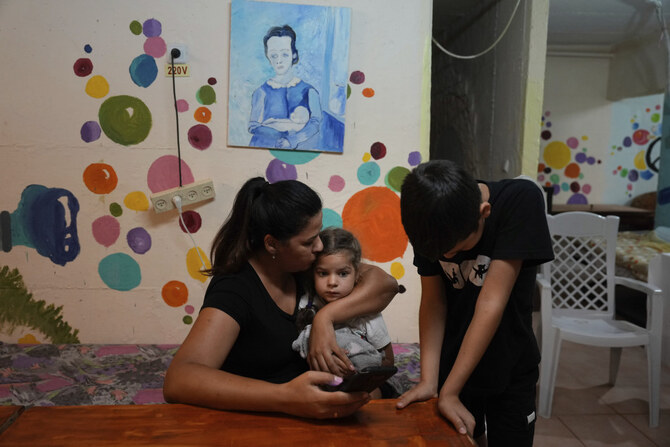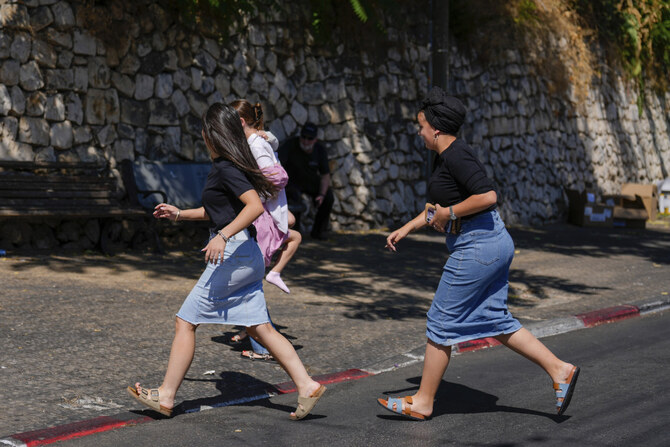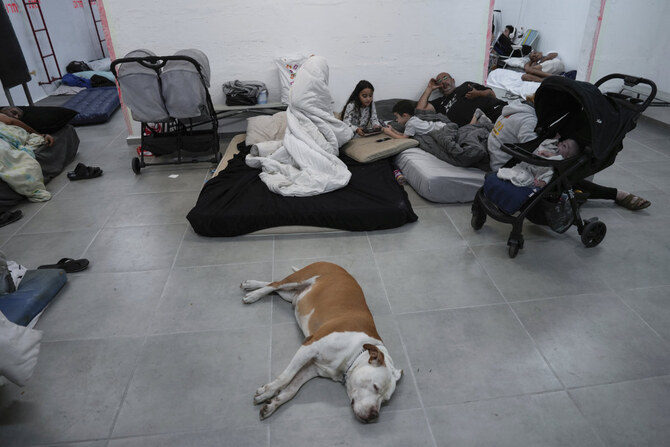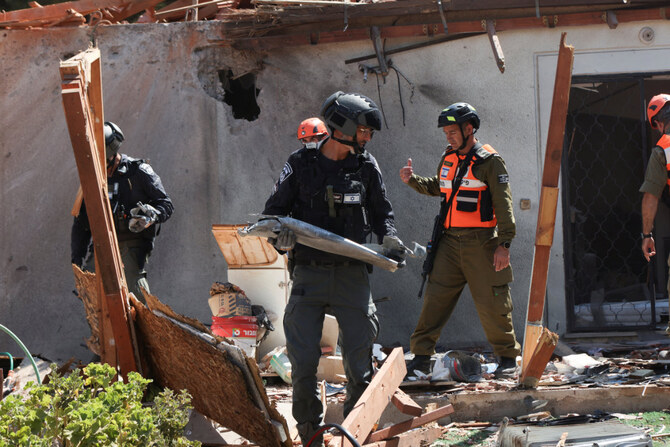WASHINGTON: US Secretary of State Antony Blinken told Israel on Thursday that further escalation to the conflict involving Lebanon will only make it harder for civilians to return home on both sides of the border, the State Department said.
Israel rejected global calls on Thursday for a ceasefire with the Hezbollah movement, defying its biggest ally in Washington and pressing ahead with strikes that have killed hundreds in Lebanon and heightened fears of an all-out regional war.
Despite Israel’s stance, the US and France sought to keep prospects alive for an immediate 21-day truce they proposed on Wednesday, and said negotiations continued, including on the sidelines of a United Nations meeting in New York.
“The Secretary discussed the importance of reaching an agreement on the 21 day ceasefire across the Israel-Lebanon border,” the State Department said in a statement referring to talks between Blinken and Israeli Minister for Strategic Affairs Ron Dermer.
“He underscored that further escalation of the conflict will only make that objective (of civilian return) more difficult.”
The State Department added that Blinken also discussed efforts to reach a ceasefire in Gaza and steps that Israel needs to take to improve delivery of humanitarian assistance in the enclave where nearly the entire 2.3 million population is displaced and a hunger crisis exists.
US President Joe Biden laid out a three-phase ceasefire proposal for Gaza on May 31 but the deal has run into obstacles, mostly over Israeli demands to maintain presence in the Philadelphi corridor on Gaza’s border with Egypt and specifics about exchanges of Israeli hostages and Palestinian prisoners.
Washington has faced mounting global and domestic criticism over its backing of Israel amid the escalation of conflict in Lebanon, where Israeli strikes have killed hundreds in recent days.
Critics say Washington has not leveraged its assistance to pressure Israel into accepting ceasefire calls. Israeli Prime Minister Benjamin Netanyahu is due to address the United Nations General Assembly on Friday.
The latest bloodshed in the decades old Israeli-Palestinian conflict was triggered on Oct. 7 when Palestinian Hamas militants attacked Israel, killing 1,200 and taking about 250 hostages, according to Israeli tallies. Israel’s subequent military assault on Gaza has killed over 41,000, according to Palestinian health authorities.
Blinken tells Israel escalation will make civilian return more difficult
https://arab.news/jrbjg
Blinken tells Israel escalation will make civilian return more difficult

- Despite Israel’s stance, the US and France sought to keep prospects alive for an immediate 21-day truce they proposed on Wednesday
- Washington has faced mounting global and domestic criticism over its backing of Israel amid the escalation of conflict in Lebanon
Israeli army says killed two Palestinian militants in West Bank

- The Ramallah-based Palestinian health ministry said Israeli authorities had informed it of the deaths of Nazzal, 25, and Shalabi, 30
In a statement, the military said that Israeli forces found the two militants barricaded in a house in the village of Burqin.
“After an exchange of fire, they were eliminated by the forces,” it said, adding one soldier was injured in the exchange.
The military identified those killed as Mohammed Nazzal and Qutaiba Shalabi, accusing them of being “affiliated with Islamic Jihad” and responsible for a deadly shooting on an Israeli bus in early January.
The Ramallah-based Palestinian health ministry said Israeli authorities had informed it of the deaths of Nazzal, 25, and Shalabi, 30.
“The bodies are being withheld” by the army, it added in a statement.
Three Israelis were killed and six injured in a January 6 attack near the village of Al-Funduq, also in the West Bank.
Israel’s Defense Minister Israel Katz said at the time he had directed the military to “act with force” to find the attackers, vowing on X that “anyone who... enables or supports the murder and harm of Jews will pay a heavy price.”
The night that followed the attack saw several instances of violent altercations with settlers in that part of the West Bank, including in the village of Hajja, whose mayor told AFP it had come under attack.
Violence has surged throughout the occupied West Bank since the Gaza war erupted on October 7, 2023.
According to the Palestinian health ministry, Israeli troops or settlers have killed at least 850 Palestinians in the West Bank since the conflict began.
During the same period, at least 29 Israelis, including soldiers, have been killed in Palestinian attacks or Israeli military operations in the territory, according to Israeli official figures.
Saudi Arabia condemns Israeli attack on West Bank’s Jenin

- Gunfire, explosions rocked Jenin on Wednesday as Israeli military kept up large-scale raid for second day
- The operation, launched just days after a ceasefire in Gaza, has left at least 10 Palestinians dead
RIYADH: Saudi Arabia has condemned Israeli forces’ attack in the occupied West Bank’s Jenin area, the Saudi Press Agency said early Thursday.
Gunfire and explosions rocked Jenin on Wednesday, an AFP journalist reported, as the Israeli military kept up a large-scale raid for a second day.
The operation, launched just days after a ceasefire paused more than a year of fighting in Gaza, has left at least 10 Palestinians dead, according to Palestinian health authorities.
Israeli officials have said the raid is part of a broader campaign against militants in the West Bank, citing thousands of attack attempts since the Gaza war erupted in October 2023.
“The Kingdom renews its demand for the international community to assume its responsibilities towards halting Israeli violations of relevant international laws and treaties,” a Saudi foreign ministry statement read.
Saudi Arabia warned that the continuation of these violations might cause the fighting and chaos to return to occupied Palestinian territories, thus risking the security and safety of civilians and undermining chances of peace in the region.
Southern forces loom large as Syria’s new rulers try to form a national army

- When the HTS-led opposition groups based in the north launched their surprise offensive last year in Aleppo, factions in the southern provinces of Daraa, Sweida and Quneitra reactivated, forming a joint operations room to coordinate with northern ones
NAWA, Syria: As opposition forces raced across Syria in a surprise offensive launched in the country’s northwest late last year, officials from several countries backing either the rebels or Syria’s government met in Qatar on what to do.
According to people briefed on the Dec. 7 meeting, officials from Turkiye, Russia, Iran and a handful of Arab countries agreed that the fighters would stop their advance in Homs, the last major city north of Damascus, and that internationally mediated talks would take place with Syrian leader Bashar Assad on a political transition.
But opposition factions from Syria’s south had other plans. They pushed toward the capital, arriving in Damascus’ largest square before dawn. Those from the north, led by the Islamist group Hayyat Tahrir Al-Sham, arrived hours later. Assad, meanwhile, had fled.
HTS, the most organized of the groups, has since established itself as Syria’s de facto rulers after coordinating with the southern fighters during the lighting-fast offensive.
Wariness among the southern factions since then, however, has highlighted questions over how the interim administration can bring together a patchwork of former rebel groups, each with their own leaders and ideology.
HTS leader Ahmad Al-Sharaa has called for a unified national army and security forces. The interim defense minister, Murhaf Abu Qasra, has begun meeting with armed groups. But some prominent leaders like southern rebel commander Ahmad Al-Awda have refused to attend.
Officials with the interim government did not respond to questions.

Cradle of the revolution
The southern province of Daraa is widely seen as the cradle of the Syrian uprising in 2011. When anti-government protests were met with repression by Assad’s security forces, “we were forced to carry weapons,” said Mahmoud Al-Bardan, a rebel leader there.
The opposition groups that formed in the south had different dynamics from those in the north, less Islamist and more localized, said Aron Lund, a fellow with the Century International think tank. They also had different backers.
“In the north, Turkiye and Qatar favored Islamist factions very heavily,” he said. “In the south, Jordanian and American involvement nudged the insurgency in a different direction.”
In 2018, factions in Daraa reached a Russian-mediated “reconciliation agreement” with Assad’s government. Some former fighters left for Idlib, the destination for many from areas recaptured by government forces, while others remained.
The deal left many southern factions alive and armed, Lund said.
“We only turned over the heavy weapons … the light weapons remained with us,” Al-Bardan said.
When the HTS-led opposition groups based in the north launched their surprise offensive last year in Aleppo, those weapons were put to use again. Factions in the southern provinces of Daraa, Sweida and Quneitra reactivated, forming a joint operations room to coordinate with northern ones.
Defying international wishes
On Dec. 7, “we had heard from a number of parties that there might be an agreement that … no one would enter Damascus so there could be an agreement on the exit of Bashar Assad or a transitional phase,” said Nassim Abu Ara, an official with one of the largest rebel factions in the south, the 8th Brigade of Al-Awda.
However, “we entered Damascus and turned the tables on these agreements,” he said.

Al-Bardan confirmed that account, asserting that the agreement “was binding on the northern factions” but not the southern ones.
“Even if they had ordered us to stop, we would not have,” he said, reflecting the eagerness among many fighters to remove Assad as soon as possible.
Ammar Kahf, executive director of the Istanbul-based Omran Center for Strategic Studies, who was in Doha on Dec. 7 and was briefed on the meetings, said there was an agreement among countries’ officials that the rebels would stop their offensive in Homs and go to Geneva for negotiations on “transitional arrangements.”
But Kahf said it was not clear that any Syrian faction, including HTS, agreed to the plan. Representatives of countries at the meeting did not respond to questions.
A statement released by the foreign ministers of Turkiye, Russia, Iran, Qatari, Saudi Arabia, Jordan and Iraq after the Dec. 7 meeting said they “stressed the need to stop military operations in preparation for launching a comprehensive political process” but did not give specifics.
The initial hours after armed groups’ arrival in Damascus were chaotic. Observers said the HTS-led forces tried to re-impose order when they arrived. An Associated Press journalist saw an argument break out when HTS fighters tried to stop members of another faction from taking abandoned army munitions.
Abu Ara acknowledged that “there was some chaos” but added, “we have to understand that these people were pent-up and suddenly they achieved the joy of victory in this manner.”

Waiting for a state
During a visit by AP journalists to the western countryside of Daraa province this month, there was no visible presence of HTS forces.
At one former Syrian army site, a fighter with the Free Syrian Army, the main faction in the area, stood guard in jeans and a camouflage shirt. Other local fighters showed off a site where they were storing tanks abandoned by the former army.
“Currently these are the property of the new state and army,” whenever it is formed, said one fighter, Issa Sabaq.
The process of forming those has been bumpy.
On New Year’s Eve, factions in the Druze-majority city of Sweida in southern Syria blocked the entry of a convoy of HTS security forces who had arrived without giving prior notice.
Ahmed Aba Zeid, a Syrian researcher who has studied the southern insurgent groups, said some of the factions have taken a wait-and-see approach before they agree to dissolve and hand over their weapons to the state.
Local armed factions are still the de facto security forces in many areas.

Earlier this month, the new police chief in Daraa city appointed by the HTS-led government, Badr Abdel Hamid, joined local officials in the town of Nawa to discuss plans for a police force there.
Hamid said there had been “constructive and positive cooperation” with factions in the region, adding the process of extending the “state’s influence” takes time.
Abu Ara said factions are waiting to understand their role. “Will it be a strong army, or a border guard army, or is it for counterterrorism?” he asked.
Still, he was optimistic that an understanding will be reached.
“A lot of people are afraid that there will be a confrontation, that there won’t be integration or won’t be an agreement,” he said. “But we want to avoid this at all costs, because our country is very tired of war.”
We cannot allow illegal annexation of the West Bank, Slovenia’s foreign minister warns

- Nothing and no one is above international law, Tanja Fajon tells Arab News in New York
- While immediate focus in Gaza must be to ensure ceasefire holds and aid enters the territory, world also needs to keep an eye on the path to a 2-state solution, she says
NEW YORK CITY: Throughout the first year of its two-year stint as an elected member of the UN Security Council, the primary world body tasked with maintaining international peace and security, Slovenia was relentless in pressing for a permanent ceasefire between Hamas and Israel in Gaza.
During the 15 months of war, Ljubljana’s representatives also intensified their calls to scale up deliveries of humanitarian aid to the starving population of the territory, while at the same time engaging in serious discussions about ways in which the implementation of a two-state solution might be expedited. Slovenia itself officially recognized Palestine as a state in June last year.
“I'm very proud that Slovenia was on the right side of history with the recognition of an independent and sovereign state of Palestine,” the country’s foreign minister, Tanja Fajon, told Arab News.
She said she is watching developments on the ceasefire front with “hope and relief,” albeit with the awareness that the situation is “very fragile.” All stakeholders in the region will have to commit to the agreement during all of its upcoming phases, she added, until it leads to a “permanent” cessation of hostilities and the dawn of long-awaited peace in the wider region.
During a chat with Arab News on the sidelines of a high-level meeting of the Security Council this week to discuss developments in the Middle East, Fajon said atrocities committed in Gaza during the conflict could amount to genocide.
On Jan. 26 last year, the International Court of Justice ruled that Israel’s actions in Gaza could amount to genocide, and set out six provisional measures with which Israel should comply to protect Palestinians in the territory from the threat of genocide. These measures included ensuring the sufficient provision of humanitarian assistance, and enabling the delivery of basic services.
Amnesty International has accused Israeli authorities of failing to take “even the bare minimum steps to comply” with the court’s ruling.
In November, the UN-backed International Criminal Court issued arrest warrants for Israeli Prime Minister Benjamin Netanyahu and the former defense minister, Yoav Gallant, as well as a former Hamas commander, citing allegations of war crimes and crimes against humanity.
ICC Judges said there were reasonable grounds to believe that Netanyahu and Gallant bear criminal responsibility, as co-perpetrators, for the war crime of using starvation as a method of warfare, and the crimes against humanity of murder, persecution and other inhumane acts.
Several countries that are signatories to the ICC ignored its findings, with some stating they would refuse to abide by the arrest warrant.
These and other instances of disregard for international law have led many around the world to lament that the international system, of which the ICJ and ICC stand as main pillars, now lies in tatters.
As Philippe Lazzarini, the head of the UN Relief and Works Agency, the largest aid organization for Palestine refugees, told Arab News last week, the war in Gaza is a “crisis of impunity.”
He said: “What we have witnessed is an extraordinary ‘crisis of impunity,’ to the extent that international humanitarian law is almost becoming irrelevant if no mechanism is put in place to address this impunity.”
However, Fajon, whose country prides itself on the enshrinement of international law as the main pillar of its foreign policy, said she remains “strongly convinced that there is no alternative to the world order, the UN Charter, international law and international humanitarian law.”
She continued: “We need this organization (the UN.) We need multilateralism to be effective.”
There is a global consensus that there should be no impunity for the perpetrators of genocide, war crimes and crimes against humanity. But to successfully prosecute these crimes in national courts, effective cooperation and collaboration among governments is essential.
Experts in international law across five continents have concluded that the current international procedural legal framework for mutual legal assistance and extradition in cases involving the most serious international crimes is incomplete and outdated, effectively hampering the ability of states to cooperate effectively in the fight against impunity.
The desire to address this issue ultimately resulted in the development of the Ljublijana-The Hague Convention, spearheaded by Slovenia, Argentina, Belgium, Mongolia, the Netherlands and Senegal, and signed last year by 32 states.
Also known as the “MLA initiative,” it is a landmark international treaty that aims to ensure justice for victims of genocide, war crimes, crimes against humanity and other international crimes by facilitating international cooperation in domestic investigations into, and prosecutions of, such crimes.
Fajon, who is also Slovenia’s deputy prime minister, said: “There can be nothing above international law and international humanitarian law.
“We are strongly committed to the work of international tribunals, be it the ICJ or ICC. And we have to really focus on accountability for those perpetrators who are responsible for atrocities and human tragedies. They have to be brought to justice.”
While the priority now must be to “vigilantly” monitor the ceasefire between Israel and Hamas in Gaza, Fajon said, and “do everything in our power” to ensure it holds and progresses to become a permanent ceasefire, “we cannot allow a possible illegal annexation of the West Bank.”
She added that “there are also really serious concerns” about UNRWA’s ability to continue its work, given an Israeli ban on the organization that is due to take effect next week.
Work with the Global Alliance on the Two State solution should also continue to help ensure a “strong” Palestinian Authority emerges after 15 months of war, Fajon said. Slovenia will also work to help facilitate Palestinian Authority control of Gaza, the West Bank and East Jerusalem, she added, and “really be engaged to make sure there is security for Israelis and statehood of Palestine, for true peace in the region to be established.”
The Saudi foreign minister, Prince Faisal bin Farhan, presided over a gathering in New York in September to discuss the situation in Gaza, which was co-hosted by the EU, the Arab League and the Organization of the Islamic Cooperation. From this meeting, which attracted more than 100 participants, the Global Alliance for the Implementation of the Two State Solution emerged.
The Kingdom plays “a crucial role” in maintaining stability in the region, Fajon said.
“Saudi Arabia is also a very important partner and mediator,” she added. “So I see a strong role of Saudi Arabia, and I hope we can rely on such a strong role also in the future, especially the role that preserves what is most necessary: that is, international law, international humanitarian law, and the UN charter.
“These have to be respected no matter where. And Saudi (Arabia) being a mediator and a good partner also to Slovenia, I do hope we will continue to develop relations in that regard.”
Trump designates Yemen’s Houthis as a ‘foreign terrorist organization’

- The Houthis’ activities threaten the security of American civilians and personnel in the Middle East, the White House says
WASHINGTON: US President Donald Trump on Wednesday re-designated Yemen’s Houthi movement, known formally as Ansar Allah, as a “foreign terrorist organization,” the White House said.
The move will impose harsher economic penalties than the Biden administration had applied to the Iran-aligned group in response to its attacks on commercial shipping in the Red Sea and against US warships defending the critical maritime chokepoint.
Proponents of the move say it is overdue, though some experts say it could have implications for anyone seen as aiding the Houthis, including some aid organizations.
“The Houthis’ activities threaten the security of American civilians and personnel in the Middle East, the safety of our closest regional partners, and the stability of global maritime trade,” the White House said in a statement.
The Houthis, who control most of Yemen, have carried out more than 100 attacks on ships plying the Red Sea since November 2023, saying they were acting in solidarity with Palestinians over Israel’s war against Hamas in Gaza. They have sunk two vessels, seized another and killed at least four seafarers.
The attacks have disrupted global shipping, forcing firms to re-route to longer and more expensive journeys around southern Africa for more than a year.
The group has targeted the southern Red Sea and the Gulf of Aden, which are joined by the narrow Bab Al-Mandab strait, a chokepoint between the Horn of Africa and the Middle East.
Under the Biden administration, the US military sought to intercept Houthi attacks to safeguard commercial traffic and waged periodic strikes to degrade Houthi military capabilities. But it did not target the group’s leadership.
At the start of his presidential term in 2021, Joe Biden had dropped Trump’s terrorist designations to address humanitarian concerns inside Yemen. Confronted with the Red Sea attacks, Biden last year designated the group as a “Specially Designated Global Terrorist” organization. But his administration held off on applying the harsher FTO designation.
British charity Oxfam said the move would worsen the suffering of Yemeni civilians, disrupting vital imports of food, medicine, and fuel.
“The Trump administration is aware of these consequences but chose to move forward anyway, and will bear responsibility for the hunger and disease that will follow,” Oxfam America’s director of peace and security, Scott Paul, said in a statement.
David Schenker, who was assistant secretary of state for Near Eastern affairs in the first Trump administration, said Trump’s move on Wednesday was an obvious, early step to respond to what he described as one of Iran’s leading proxy forces in the Middle East.
“While the redesignation likely won’t have a positive impact on the group’s behavior, the measure suggests the new administration is not looking to induce (or cajole) the Iranians to negotiations through blandishment,” Schenker told Reuters.
The Trump administration said the US will work with regional partners to eliminate Houthi capabilities, deprive it of resources “and thereby end its attacks on US personnel and civilians, US partners, and maritime shipping in the Red Sea.”
The designation will also trigger a broad review of UN partners, non-governmental organizations and contractors operating in Yemen, the White House said.
“The President will direct USAID to end its relationship with entities that have made payments to the Houthis, or which have opposed international efforts to counter the Houthis while turning a blind eye toward the Houthis’ terrorism and abuses,” the White House said.
The Houthis in recent days have signaled they were scaling back attacks in the Red Sea following a multi-phase cease fire deal between Israel and Hamas. Earlier on Wednesday, the group released the crew of the Galaxy Leader commercial ship more than a year after they seized their Bahamas-flagged vessel off the Yemeni coast.





















